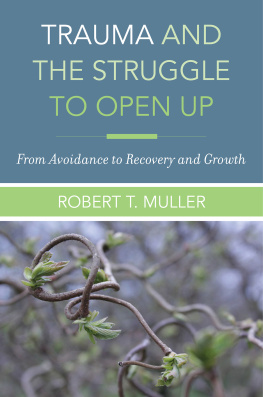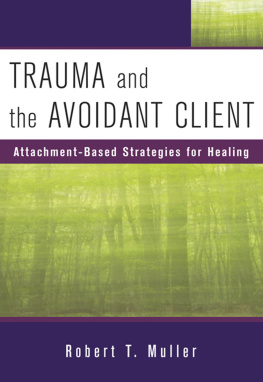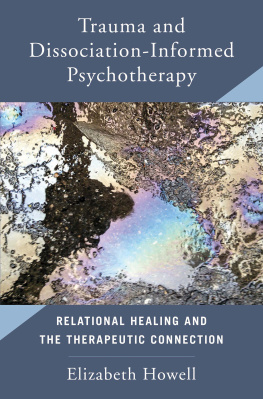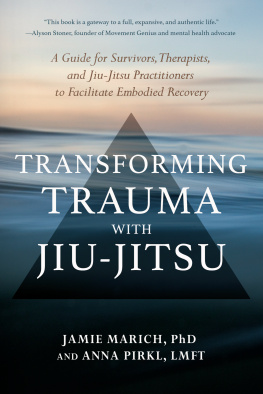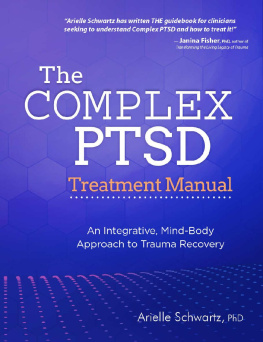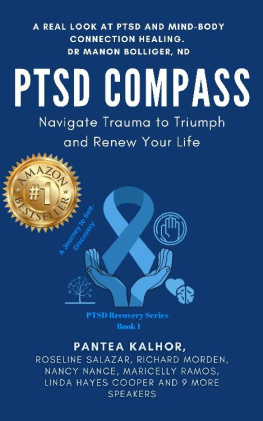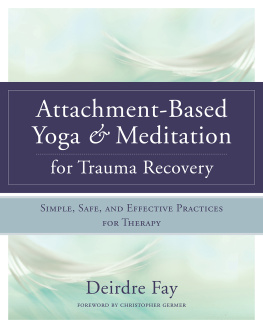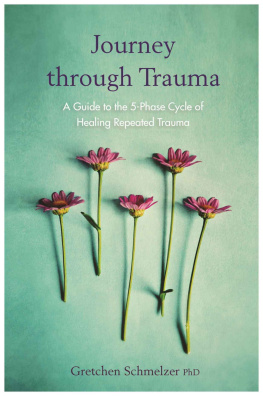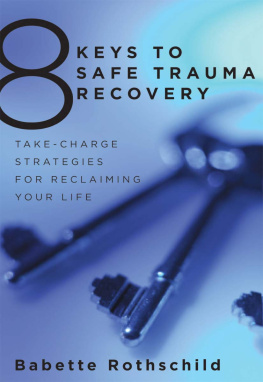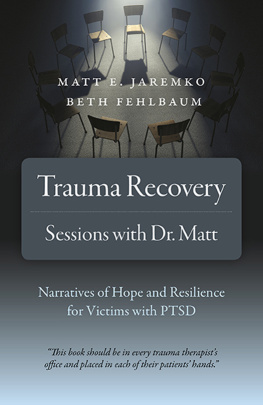
TRAUMA and the
STRUGGLE TO OPEN UP
TRAUMA and the
STRUGGLE TO OPEN UP
From Avoidance to
Recovery and Growth
Robert T. Muller

Note to Readers: Standards of clinical practice and protocol change over time, and no technique
or recommendation is guaranteed to be safe or effective in all circumstances. This volume is
intended as a general information resource for professionals practicing in the field of psychotherapy
and mental health; it is not a substitute for appropriate training, peer review, and/or clinical
supervision. Neither the publisher nor the author(s) can guarantee the complete accuracy, efficacy,
or appropriateness of any particular recommendation in every respect.
Copyright 2018 by Robert T. Muller
All rights reserved
First Edition
For information about permission to reproduce selections from this book, write to
Permissions, W. W. Norton & Company, Inc., 500 Fifth Avenue, New York, NY 10110
For information about special discounts for bulk purchases, please contact
W. W. Norton Special Sales at specialsales@wwnorton.com or 800-233-4830
Production manager: Christine Critelli
JACKET DESIGN BY LAUREN GRAESSLE
JACKET PHOTOGRAPH @ PIA PEDERSEN / EYEEM
The Library of Congress has cataloged the printed edition as follows:
Names: Muller, Robert T., author.
Title: Trauma and the struggle to open up : from avoidance to
recovery and growth/ Robert T. Muller.
Description: First edition. | New York : W.W. Norton & Company, [2018] |
Series: A Norton professional book | Includes bibliographical references.
Identifiers: LCCN 2017060909 | ISBN 9780393712261 (hardcover)
Subjects: LCSH: Psychic traumaTreatment. | Psychotherapist and patient. | Psychotherapy.
Classification: LCC RC552.P67 M86 2018 | DDC 616.85/210651dc23
LC record available at https://lccn.loc.gov/2017060909
ISBN 978-0-393-71227-8 (e-book)
W. W. Norton & Company, Inc., 500 Fifth Avenue, New York, N.Y. 10110
www.wwnorton.com
W. W. Norton & Company Ltd., 15 Carlisle Street, London W1D 3BS
To my parents,
Eva and Louis Muller.
With love.
Contents
A lmost fifteen years ago, one of my colleagues, Catherine Classen, introduced me to a group of trauma therapists whose commitment to creative scholarship in the field was matched only by a deep commitment to the well-being of their clients. The International Society for the Study of Trauma and Dissociation would soon become my go-to place for clinical insight, support, and collaboration. I thank the society for providing a context for education and training in the field, excellence in research, and openness to novel interventions. Trauma therapy is hard to do without supportive colleagues.
My gratitude goes out to many people. The writing benefited greatly from comments, editorial changes, and critique provided by: Aviva Philipp-Muller, Mike Rand, Ruth Rohn, Steven Muller, and Diane Philipp. Daniel Lantos helped with early concept development; Aaron Philipp-Muller assisted with cultural memory content; Noah Philipp-Muller clarified linguistic details. Norton editors Ben Yarling and Deborah Malmud helped with earlier drafts of the manuscript.
Thanks also to my clinical sites monthly psychodynamic reading group. The opportunity to share clinical ideas, to challenge and learn from one another is priceless. Acknowledgment goes to Christie Hayos, Art Caspary, Diane Philipp, and Robyn Lam.
I am also grateful for the opportunity to teach and work with my doctoral and postdoctoral students, whose dedication to learning is unmatched: Sara Rependa, Leah Keating, Sheila Konanur, Kris Cordeiro, Laura Goldstein, Karina Zorzella, Julie Cinamon, and Kristin Thornback.
In addition, I would like to express my appreciation for my clients, who have been my best teachers.
Finally, this book could not have been written without the support and patience of my wife, friend, and colleague Diane Philipp, as well as my children, Aviva, Aaron, and Noah. Their love is nearly boundless. And that makes me very fortunate.
W e love, we hate, we fight, we fear. Our close relationships shape the contours of our lives.
They bring the greatest joy, they draw us into sadness. We fret well lose them... we lose them anyway. As children, they keep us alive. They bring the world color, they bring a lasting misery.
Our relationships sustain us, they help us endure. They bring a heavy pain, they challenge us. How we navigate them forms character. The feelings they stir dot the ups and downs of experience. They remind us of who we are, they dominate memory.
When they hurt, they consume us. When they dont, we take them for granted. They inform our coupling, our parenting.
They chapter the stories that make up our lives.
In a candid interview from a few years ago, renowned baseball pitcher and trauma survivor R. A. Dickey spoke to Canadas National Post (Fowles, 2013). He shared his perspectives on books, baseball, and what it means to heal from childhood sexual abuse. In Dickeys words:
Ultimately, the thing that helped me find some healing [was when] I learned that life was not about turning the page, or getting to the other side of something. Its about holding what is broken about the world, and holding what is joyful about the world, and being able to take a step forward with both. This is living well in the moment. And thats what Ive tried to make a discipline of.
Relationships are at the center of human experience and at the heart of trauma. To hold the broken and the joyful, we must face the relationships that bring both. To heal from trauma is to embrace the truth of the pastthe losses, the betrayals, the disappointments from those we trusted most.
This book is about trauma. Its about the relationships in our lives that hurt and harm. Its about the ones that help and heal.
Indeed when we study trauma, we see what a double-edged sword relationships are: Trauma stems from them. Recovery depends on them. The most harrowing trauma happens in close relationships, but recovery cant happen in isolation. Relationships are both poison and antidote. This, in part, is why we see the avoidance of closeness in many trauma survivorsa certain safety comes with avoidance, but the price is high.
I agree with R. A. Dickey: Healing doesnt come from turning the page. It comes from attending to the past and finding ones place in the here and now. Its not easy... even harder to do solo.
Opening up, facing our history, deliberately, authenticallythis happens in the context of a healing relationship. How does this look, from beginning to end? How does a shared telling bring recovery and growth? How does trauma therapy use the relationship to heal? That is the subject of this book.
I get asked a lot, how did I develop an interest in trauma? I used to have a ready answerone focusing on the intellectual side of me: my interest in research, clients, and so on. Perhaps true, in part. But a more honest answer was something I appreciated only in my early forties: My interest in trauma work stemmed from my past, my familys history.
My parents were school-age children during the Holocaust. They grew up in Budapest, Hungary. As Jews, their lives were, at the time, in constant danger. And they survived only because of a combination of luck and the goodwill of non-Jewish family members, who took great personal risks to help. As a young child, my mother was separated from her family, given false papers, and put into hiding with near-strangersa sensible strategy, under the circumstances. With no family around for long stretches, she came terrifyingly close to having her identity revealedsome adults were keen to betray her as Jewish. It was only a fluke that she survived. As for my father,
Next page
